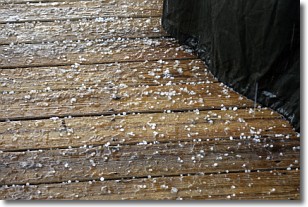Weather Alert in Wisconsin
Air Quality Alert issued July 31 at 10:52AM CDT by NWS Twin Cities/Chanhassen MN
AREAS AFFECTED: Polk; Barron; Rusk; St. Croix; Pierce; Dunn; Pepin; Chippewa; Eau Claire
DESCRIPTION: The Wisconsin Department of Natural Resources has issued an Air Quality Advisory for the following counties: Barron, Chippewa, Dunn, Eau Claire, Pepin, Pierce, Polk, Rusk, St. Croix. WHAT...The PM2.5 AQI is expected to reach the Unhealthy for Sensitive Groups (USG) to Unhealthy level. WHERE...All of Wisconsin. WHEN...Until noon Friday, August 1.
INSTRUCTION: Sensitive groups: Consider rescheduling or moving all activities inside. Go inside if you have symptoms. People with asthma: Follow your asthma action plan and keep quick-relief medicine handy. People with heart disease: Symptoms such as palpitations, shortness of breath, or unusual fatigue may indicate a serious problem. If you have any of these, contact your health care provider. Everyone else: Keep outdoor activities shorter and less intense. Go inside if you have symptoms. Additional Details: Canadian wildfire smoke will continue to impact Wisconsin`s surface air quality over the next several days. Widespread Unhealthy (Red) AQI for PM2.5 is expected across Wisconsin on Thursday, with NowCast AQI values in the Very Unhealthy (Purple) category possible. Conditions are expected to slowly improve beginning Friday. However, Unhealthy for Sensitive Groups (Orange) to Unhealthy (Red) AQI will remain possible through the weekend. Conditions will be reevaluated on a day-to-day basis through the weekend, including updates to the forecast and any associated Air Quality Advisories. For more information on current air quality, please see: https://airquality.wi.gov
Want more detail? Get the Complete 7 Day and Night Detailed Forecast!
Current U.S. National Radar--Current
The Current National Weather Radar is shown below with a UTC Time (subtract 5 hours from UTC to get Eastern Time).

National Weather Forecast--Current
The Current National Weather Forecast and National Weather Map are shown below.

National Weather Forecast for Tomorrow
Tomorrow National Weather Forecast and Tomorrow National Weather Map are show below.

North America Water Vapor (Moisture)
This map shows recent moisture content over North America. Bright and colored areas show high moisture (ie, clouds); brown indicates very little moisture present; black indicates no moisture.

Weather Topic: What is Rain?
Home - Education - Precipitation - Rain
 Next Topic: Shelf Clouds
Next Topic: Shelf Clouds
Precipitation in the form of water droplets is called rain.
Rain generally has a tendency to fall with less intensity over a greater period
of time, and when rainfall is more severe it is usually less sustained.
Rain is the most common form of precipitation and happens with greater frequency
depending on the season and regional influences. Cities have been shown to have
an observable effect on rainfall, due to an effect called the urban heat island.
Compared to upwind, monthly rainfall between twenty and forty miles downwind of
cities is 30% greater.
Next Topic: Shelf Clouds
Weather Topic: What is Sleet?
Home - Education - Precipitation - Sleet
 Next Topic: Snow
Next Topic: Snow
Sleet is a form of precipitation in which small ice pellets are the primary
components. These ice pellets are smaller and more translucent than hailstones,
and harder than graupel. Sleet is caused by specific atmospheric conditions and
therefore typically doesn't last for extended periods of time.
The condition which leads to sleet formation requires a warmer body of air to be
wedged in between two sub-freezing bodies of air. When snow falls through a warmer
layer of air it melts, and as it falls through the next sub-freezing body of air
it freezes again, forming ice pellets known as sleet. In some cases, water
droplets don't have time to freeze before reaching the surface and the result is
freezing rain.
Next Topic: Snow
Current conditions powered by WeatherAPI.com




